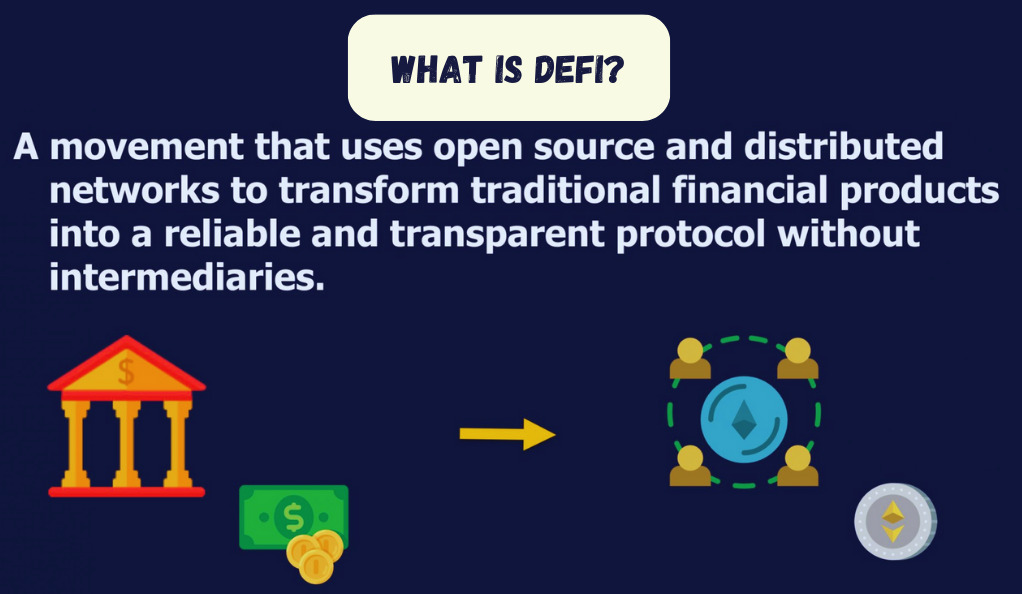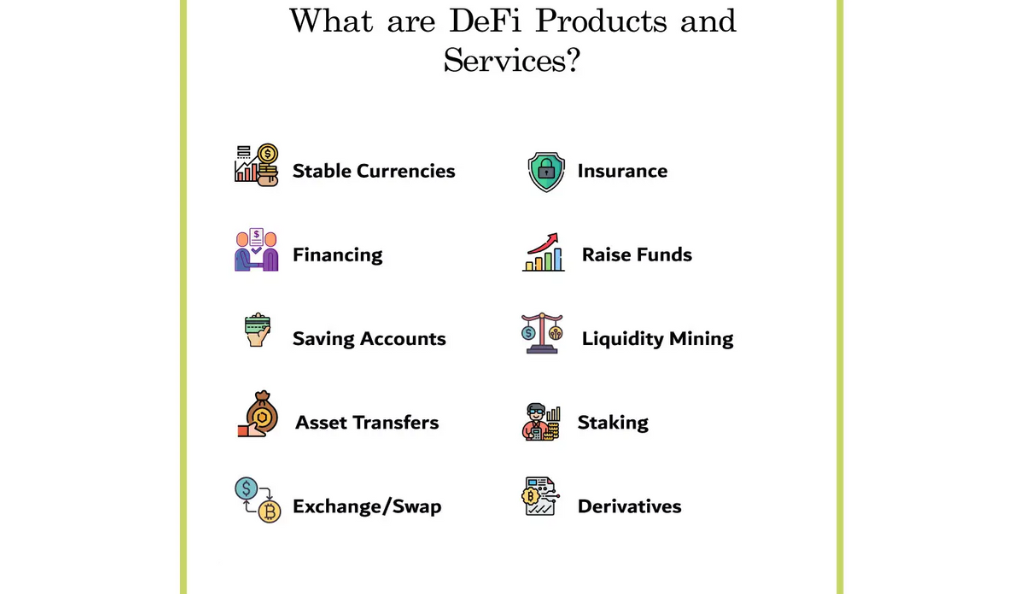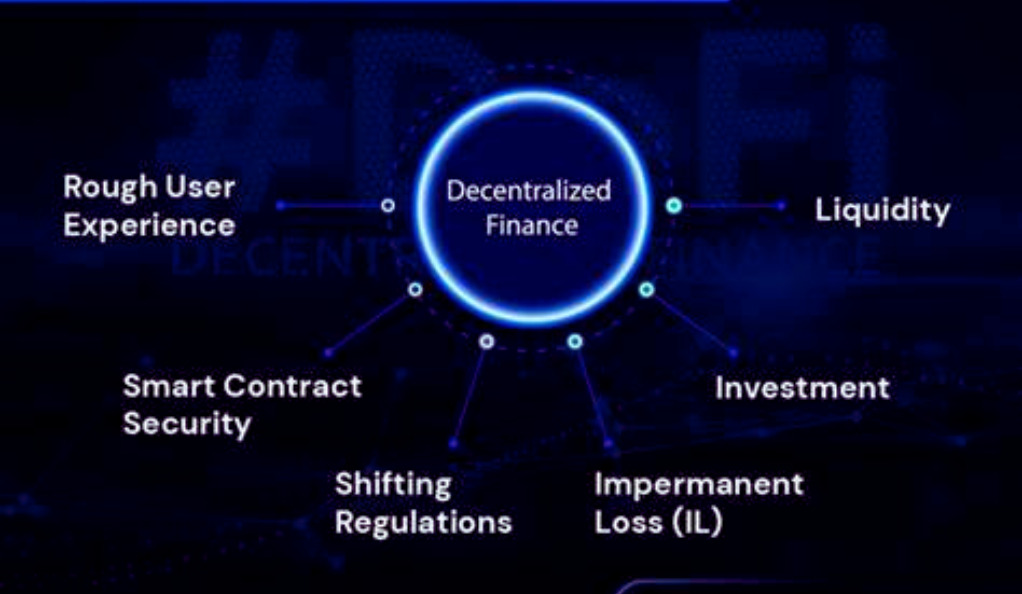In the vast realm of finance, a new player has emerged that’s making waves: Decentralized Finance, or DeFi for short. This innovative approach seeks to reshape the financial landscape, offering promising solutions for many of the traditional system’s shortcomings.
What is DeFi?
DeFi stands for “Decentralized Finance”. At its core, it aims to create a financial system that’s open to everyone, bypassing traditional intermediaries like banks, brokers, and other financial institutions. Instead of these, it uses blockchain technology to ensure security, transparency, and accessibility.

Origin of DeFi
The roots of DeFi can be traced back to the development and adoption of Bitcoin, the pioneer cryptocurrency. Bitcoin was the first to propose a decentralized form of money, free from government and banking control. Building on this foundation, innovative minds began to envision a broader decentralized financial ecosystem. Ethereum, with its smart contract functionality, gave a significant push to the DeFi movement, offering a platform where these financial solutions could be developed and deployed.
Core Principles
DeFi doesn’t just disrupt – it revolutionizes with principles that promise to democratize finance. Its core principles include:
- Open Access: DeFi platforms are accessible to anyone with an internet connection. This democratizes finance, especially for those in underserved regions.
- Transparency: All transactions on the blockchain are public. This promotes trust and accountability in the system.
- Censorship Resistance: With no central authority, transactions in the DeFi space are immutable and cannot be easily censored or reversed.
Why is DeFi Gaining Popularity?
The wave of popularity surrounding DeFi isn’t accidental. It’s a direct response to the inefficiencies and exclusivities of the traditional financial system.
Financial Inclusion
Billions of people worldwide lack access to basic financial services. DeFi has the potential to bridge this gap. Without the need for intermediaries, a person from any part of the world can access financial services directly from their smartphones, granting financial empowerment to the masses.
Transparency and Control
One major advantage of DeFi is the unprecedented transparency it offers. Every transaction, every contract, and every movement is recorded on a public ledger. For users, this means a clear overview of where their money is and how it’s being used. In a world where mistrust in financial institutions is growing, this transparency acts as a beacon of hope.
Potentially Higher Returns
The decentralized nature of DeFi platforms often means fewer overheads, allowing for potentially higher returns for investors and users. Platforms like Compound, for instance, have reward models that traditional banks can’t match. However, it’s crucial to balance this potential with the inherent risks involved.
DeFi Products and Services

From lending platforms to stablecoins, DeFi has introduced a suite of products that rival traditional finance.
Lending and Borrowing Platforms
Platforms such as Aave and MakerDAO have disrupted traditional lending and borrowing. Without the need for credit checks or lengthy approval processes, these platforms allow users to lend or borrow assets based on collateral. The peer-to-peer nature ensures better rates and quicker transactions.
Decentralized Exchanges (DEXs)
DEXs like Uniswap offer a platform for users to exchange assets without relying on a centralized entity. This not only ensures security but also reduces fees associated with trades. Users retain full control of their assets until the transaction is executed, reducing risks of hacks or platform failures.
Stablecoins
Stablecoins like USDC or DAI are pegged to a stable asset, usually fiat currencies like the USD. They offer the best of both worlds: the stability of fiat and the flexibility of crypto. These coins can be traded, used in transactions, or even earned as interest, offering a buffer against the volatility of other cryptos.
Potential Risks of DeFi
No financial system, traditional or decentralized, is without risks. DeFi, despite its promises, has its set of challenges.
Smart Contract Failures
Smart contracts are at the heart of DeFi. However, they’re only as good as the code they’re written in. A single vulnerability can lead to massive financial losses. Recent exploits in various DeFi platforms have shown that there’s no room for complacency.
Regulatory Concerns
As DeFi continues to grow, so does the attention from regulatory bodies. The decentralized nature of these platforms poses challenges for regulators. How do you regulate something that’s inherently resistant to control? This tussle between innovation and regulation will define DeFi’s path forward.

The Future of DeFi
As with all innovations, the future is a mix of immense potential and looming challenges.
Innovation and Growth
The DeFi sector is just getting started. As technology evolves and more people join the ecosystem, we can expect groundbreaking solutions that address many of the financial system’s current limitations. With more brains in the space, the next big thing in DeFi could be just around the corner.
Challenges Ahead
The road ahead is not without bumps. From technological challenges like scalability and interoperability to external factors like regulation and competition, DeFi has its work cut out. However, with its robust foundational principles and a community-driven approach, the future looks promising.
Conclusion
DeFi, with its array of products and services, has presented a compelling alternative to the traditional financial system. As we stand at the cusp of a financial revolution, it’s essential to equip ourselves with knowledge and tread with caution. The decentralized future beckons, and it’s ours to shape.
FAQs
Decentralized Finance or DeFi is a blockchain-based financial system that operates without traditional intermediaries.
It offers financial inclusion, transparency, potential for higher returns, and direct control over one’s finances.
They use blockchain technology and cryptographic techniques. However, risks like smart contract vulnerabilities do exist.
Currently, it operates in a grey area. However, as its popularity grows, regulatory bodies worldwide are showing increased interest.
Yes, several DeFi platforms offer lending services where you can earn interest on your crypto assets.